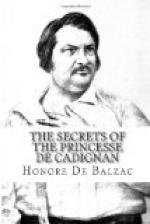“That is noble praise for both natures,” said Madame de Cadignan, timidly.
“During the last four years of his life,” continued Daniel, “he made to me alone a confidence of his love for you, and this confidence knitted closer than ever the already strong ties of brotherly affection. He alone, madame, can have loved you as you ought to be loved. Many a time I have been pelted with rain as we accompanied your carriage at the pace of the horses, to keep at a parallel distance, and see you—admire you.”
“Ah! monsieur,” said the princess, “how can I repay such feelings!”
“Why is Michel not here!” exclaimed Daniel, in melancholy accents.
“Perhaps he would not have loved me long,” said the princess, shaking her head sadly. “Republicans are more absolute in their ideas than we absolutists, whose fault is indulgence. No doubt he imagined me perfect, and society would have cruelly undeceived him. We are pursued, we women, by as many calumnies as you authors are compelled to endure in your literary life; but we, alas! cannot defend ourselves either by our works or by our fame. The world will not believe us to be what we are, but what it thinks us to be. It would soon have hidden from his eyes the real but unknown woman that is in me, behind the false portrait of the imaginary woman which the world considers true. He would have come to think me unworthy of the noble feelings he had for me, and incapable of comprehending him.”
Here the princess shook her head, swaying the beautiful blond curls, full of heather, with a touching gesture. This plaintive expression of grievous doubts and hidden sorrows is indescribable. Daniel understood them all; and he looked at the princess with keen emotion.
“And yet, the night on which I last saw him, after the revolution of July, I was on the point of giving way to the desire I felt to take his hand and press it before all the world, under the peristyle of the opera-house. But the thought came to me that such a proof of gratitude might be misinterpreted; like so many other little things done from noble motives which are called to-day the follies of Madame de Maufrigneuse—things which I can never explain, for none but my son and God have understood me.”
These words, breathed into the ear of the listener, in tones inaudible to the other guests, and with accents worthy of the cleverest actress, were calculated to reach the heart; and they did reach that of d’Arthez. There was no question of himself in the matter; this woman was seeking to rehabilitate herself in favor of the dead. She had been calumniated; and she evidently wanted to know if anything had tarnished her in the eyes of him who had loved her; had he died with all his illusions?
“Michel,” replied d’Arthez, “was one of those men who love absolutely, and who, if they choose ill, can suffer without renouncing the woman they have once elected.”
“Was I loved thus?” she said, with an air of exalted beatitude.




